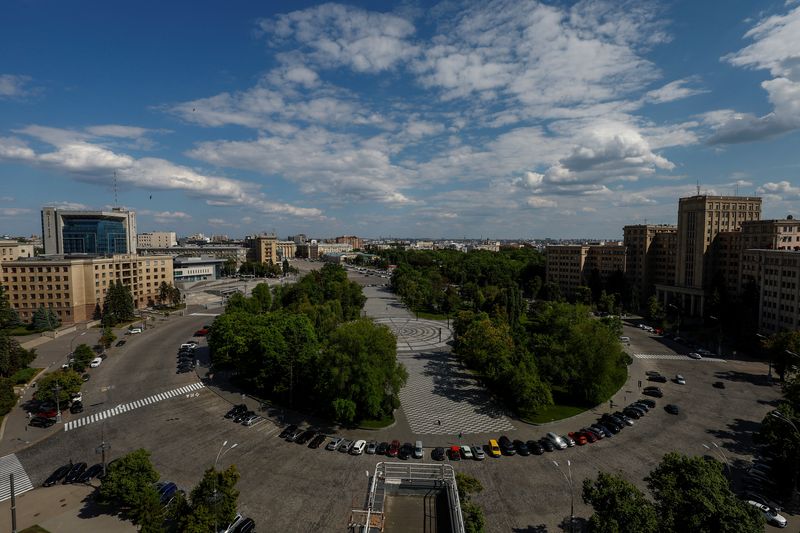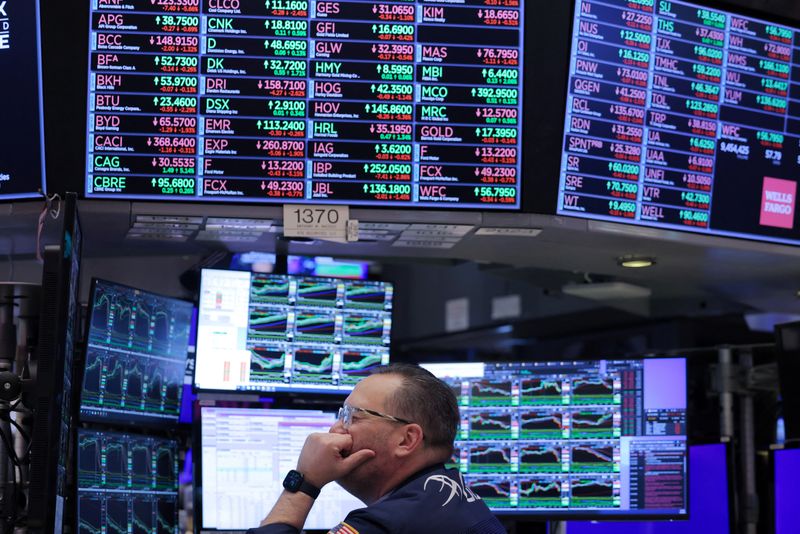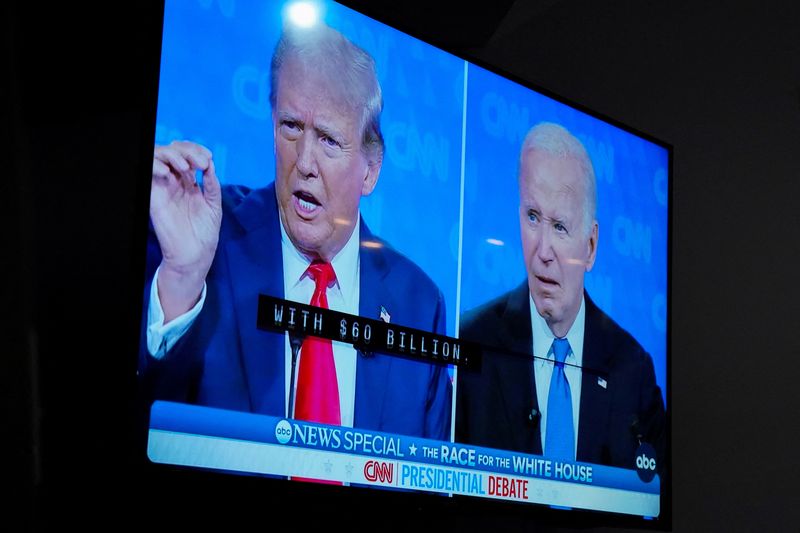Select Language

LONDON (Reuters) - Prices in British shops rose at the slowest pace in almost three years last month, according to industry figures that underscore how inflation has cooled even if Prime Minister Rishi Sunak is unlikely to see much benefit in this week's national election.
Annual shop price inflation slowed to 0.2% in June from 0.6%in May, the smallest increase since October 2021, the British Retail Consortium said on Tuesday.
Prices for non-food goods fell by 1.0% in annual terms after a 0.8% drop in May - helped by promotions on TV sets timed to coincide with the Euro 2024 soccer tournament - while food inflation slowed for a 14th month in a row to 2.5% from 3.2%%.
"This will be of help to shoppers as they plan their household budgets for essential goods and services," said Mike Watson, head of retailer and business insight at NielsenIQ, which provides data for the BRC.
"With uncertainty around discretionary spending, we expect the intense competition across the marketplace to keep price increases as low as possible this summer."
Sunak has sought to claim credit for the fall in headline inflation which topped 11% in 2022 and returned in May to the Bank of England's 2% target. But opinion polls suggest his Conservative Party will lose heavily to the opposition Labour Party in Thursday's election.
The BoE is assessing whether price pressures have abated sufficiently for it to cut interest rates for the first time since 2020. However, with inflation in the services sector running at nearly 6%, it remains unclear when it might make its move.
Investors are putting a roughly 60% chance on the BoE cutting Bank Rate to 5.0% from 5.25% on Aug. 1.
BRC Chief Executive Helen Dickinson said investment by retailers to improve their operations and supply chains was limiting price rises. She urged the next government to fix cost burdens such as the business rates tax on commercial property and an apprenticeship levy that employers say is inflexible.

By Libby George and Karin Strohecker
LONDON (Reuters) -Ukraine told investors it still expects to succeed in its unprecedented aim of restructuring debt in the middle of a war before payment moratoriums expire by Aug. 1, according to two sources who joined a call with the Finance Ministry on Monday.
The war-torn country also intends to include GDP warrants as part of its effort to restructure some $20 billion of international bonds, said the sources.
Monday's call marks part of Ukraine's fresh push to engage with investors after formal restructuring talks last month ended without an agreement.
Statements released last week showed there was a wide gap between the 20% haircut bondholders are prepared to give and a proposal from Ukraine that would have translated into a haircut of up to 60%.
"They believe that an agreement can be reached soon," one of the sources said, speaking on condition of anonymity. Yuriy Butsa, head of Ukraine's debt management office, who is leading the country's engagement with creditors, spoke on the call and was joined by representatives from the government's advisers and the IMF mission chief to Ukraine, Gavin Gray, the sources said.
On the creditor side, members of the Ad Hoc Creditor Committee joined, along with investors who were not part of the group.
Ukraine has $19.7 billion outstanding on its international bonds and owes $2.6 billion on GDP warrants - a fixed-income instrument with payouts that are linked to the strength of economic output growth. The warrants were created as a sweetener to creditors during Ukraine's 2015 debt restructuring in the wake of Russia's annexation of Crimea.

SEOUL (Reuters) - South Korea's consumer inflation weakened more than expected to an 11-month low in June as supply-side pressures eased, official data showed on Tuesday.
The consumer price index (CPI) rose 2.4% higher in June from a year earlier, slower than the 2.7% rise in May and the weakest since July 2023, according to Statistics Korea.
It was also well below the median 2.7% rise tipped in a Reuters survey of economists.
The index fell 0.2% on a monthly basis, after a 0.1% rise in the previous month, marking the first decline in seven months.
By product, prices of agricultural goods fell 5.3% over the month while petroleum goods lost 2.9%, dragging the index lower.
South Korea's central bank governor said last month the pace of consumer inflation is likely to continue to slow, feeding expectations the Bank of Korea will start cutting interest rates towards the end of this year.
The central bank, which targets medium-term inflation of 2%, extended its interest rate pause for an 11th straight meeting in May. The bank next meets on July 11.
The core CPI, excluding volatile food and energy items, was 2.2% higher in June than a year before, in line with May.

By Tim Hepher, Shivani Tanna and Mike Stone
(Reuters) -Boeing agreed to buy back Spirit AeroSystems (NYSE:SPR) for $4.7 billion in stock and Airbus moved to take on the supplier's loss-making Europe-focused activities in return for hundreds of millions of dollars of compensation in a rare coordinated move.
The near-two-decade independence of the world's largest standalone aerostructures company ended in a carve-up between its largest customers after the Boeing (NYSE:BA) 737 MAX crisis sparked by a mid-air door plug blowout in January brought to a head doubts over the resilience of fuselage manufacturing.
Boeing, which spun off Spirit in 2005, said it would buy its former subsidiary for about $37.25 per share, as reported by Reuters on Sunday, giving it an enterprise value of $8.3 billion including debt.
"Bringing Spirit and Boeing together will enable greater integration of both companies' manufacturing and engineering capabilities, including safety and quality systems," Spirit CEO Pat Shanahan said in a statement.
Spirit's shares closed at $32.87 on Friday. The Wichita, Kansas-based company said the deal value offered a 30% premium since the day before Boeing and Spirit announced merger talks on March 1.
Boeing has long pondered buying back its former subsidiary, which analysts say has struggled to thrive independently despite diversifying into work for Europe's Airbus and others.
But the decision to go ahead comes as Boeing tries to resolve a sprawling corporate and industrial crisis that has engulfed one of the industry's key suppliers.
Boeing is trying to move past months of difficulties sparked by the Jan. 5 blowout of a door plug on a virtually new Alaska Airlines 737 MAX 9 jet that exposed industrial quality problems.
Those issues have led to a substantial slowdown in output at Boeing, rippling across the global commercial aviation industry.
The U.S. planemaker has announced the planned departure of its CEO, Dave Calhoun in the wake of the crisis, with industry executives and analysts pointing to Spirit's Shanahan, a former Boeing executive, as one of the possible replacements.
It was not immediately clear how long he might be tied to Spirit, with the Boeing deal not due to close until mid-2025.
AIRBUS DEAL
Spirit, the manufacturer of the door plug, had been spun off from Boeing in one of a series of moves that critics say were emblematic of a focus on cost-cutting over quality.
Boeing made the decision to buy back Spirit in the aftermath of the door plug blowout, in what it described as an effort to address its safety problems and shore up its production line.
Separately, Airbus, also a Spirit customer, confirmed it would take over core activities at four of the supplier's plants in the United States, Northern Ireland, France and Morocco as reported by Reuters last week.
It will also take over minor work currently carried out in Wichita. The separate Airbus deal was triggered by talks between Boeing and Spirit and was loosely coordinated between the three companies, sources said. It is subject to due diligence.
Airbus shares opened 2.4% higher on Monday.
Because the Airbus-related activities lose money, industry sources had said the European planemaker was pressing for up to $1 billion in compensation in return for taking over the plants, which make strategic parts for the A350 and A220 jets.
Airbus said it would receive $559 million in compensation from Spirit, depending on the final outlines of the deal, while it would pay the supplier a symbolic $1 for the assets.
That echoes its decision to buy the Canadian-designed CSeries small jetliner program for just $1 from Bombardier (OTC:BDRBF) in 2018. It later renamed the jet the A220.
Until the latest shake-up, Airbus had not proposed to take control of the high-tech but loss-making A220 wings manufacturing carried out in a historic plant in Belfast, which Spirit bought from Bombardier in 2019.
Monday's deal lifts doubts over the future of Northern Ireland's top industrial employer for the second time in five years, though sources have said Airbus may need to invest $1 billion to $2 billion in a redesign to make the wings affordable to produce.
Spirit said it also planned to sell businesses and operations in Prestwick, Scotland and in Subang, Malaysia that support Airbus programs and those in Belfast that do not support Airbus programs.

BEIJING (Reuters) - Prices of new homes in China climbed at their slowest pace in five months in June, a private survey showed on Monday, with a recent major government package of support measures for the country's ailing property sector having only a limited impact so far.
The average price for new homes across 100 cities edged up 0.15% month-on-month in June, weaker than a 0.25% gain in May, according to data from property researcher China Index Academy.
The value of new home sales at China's top 100 real estate companies slid 41.6% in January-June from the same period a year ago, it also said.
In May, Chinese authorities unveiled what they called a historic support package for the property sector that has been hit hard by a liquidity crunch since 2021 with many firms defaulting on debt.
The package further cut downpayment requirements and removed the floor for mortgage rates. Local governments can also now instruct state-owned firms (SOEs) to purchase completed unsold apartments from property developers and convert them into social housing.
The China Index Academy data also showed the average price of second-hand homes across 100 cities fell 0.73% in June from a month earlier, the 26th straight month of declines.

By Juliette Jabkhiro and Layli Foroudi
PARIS (Reuters) -Marine Le Pen's far-right National Rally (RN) party scored historic gains to win the first round of France's parliamentary election on Sunday, exit polls showed, but the final result will depend on days of horsetrading before next week's run-off.
The RN was seen winning around 34% of the vote, exit polls from Ipsos, Ifop, OpinionWay and Elabe showed, in a huge setback for President Emmanuel Macron who had called the snap election after his ticket was trounced by the RN in European Parliament elections earlier this month.
The RN's share of the vote was comfortably ahead of leftist and centrist rivals, including Macron's Together alliance, whose bloc was seen winning 20.5%-23%. The New Popular Front (NFP), a hastily assembled left-wing coalition, was projected to win around 29% of the vote, the exit polls showed.
The exit polls were in line with opinion surveys ahead of the election, and were met with jubilation by Le Pen's supporters. However, they provided little clarity on whether the anti-immigrant, eurosceptic RN will be able to form a government to "cohabit" with the pro-EU Macron after next Sunday's run-off.
A longtime pariah for many in France, the RN is now closer to power than it has ever been. Le Pen has sought to clean up the image of a party known for racism and antisemitism, a tactic that has worked amid voter anger at Macron, the high cost of living and growing concerns over immigration.
At Le Pen's Henin-Beaumont constituency in northern France, supporters waved French flags and sung the Marseillaise.
"The French have shown their willingness to turn the page on a contemptuous and corrosive power," Le Pen told the cheering crowd.
The RN's chances of winning power next week will depend on the political dealmaking made by its rivals over the coming days. In the past, centre-right and centre-left parties have teamed up to keep the RN from power, but that dynamic, known as the "republican front," is less certain than ever.
If no candidate reaches 50% in the first round, the top two contenders automatically qualify for the second round, as well as all those with 12.5% of registered voters. In the run-off, whoever wins the most votes take the constituency.
High turnout on Sunday suggests France is heading for a record number of three-way run-offs. These generally benefit the RN much more than two-way contests, experts say.
The horsetrading began almost immediately on Sunday night.
Macron called on voters to rally behind candidates who are "clearly republican and democratic", which, based on his recent declarations, would exclude candidates from the RN and from the hard-left France Unbowed (LFI) party.
Political leaders from the centre-left and far-left all called on their third-placed candidates to drop out.
"Our guideline is simple and clear: not a single more vote for the National Rally," France Unbowed leader Jean-Luc Melenchon said.
However, the centre-right Republicans party, which split ahead of the vote with a small number of its lawmakers joining the RN, gave no guidance.
POSSIBLE PRIME MINISTER
Jordan Bardella, the 28-year-old RN party president, said he was ready to be prime minister - if his party wins an absolute majority. He has ruled out trying to form a minority government and neither Macron nor the NFP leftist group will form an alliance with him.
"I will be a "cohabitation" Prime Minister, respectful of the constitution and of the office of President of the Republic, but uncompromising about the policies we will implement," he said.
The mood was gloomy at the Republique square in Paris, where a few thousand anti-RN protesters gathered at a rally of the leftist alliance on Sunday night.
Najiya Khaldi, a 33-year-old teacher, said she felt "disgust, sadness and fear" at the RN's strong results.
"I am not used to demonstrating," she said. "I think I came to reassure myself, to not feel alone."
Market reaction to Sunday's result was muted, with the euro gaining around 0.23% in early Asia-Pacific trading. Fiona Cincotta, senior markets analyst at London's City Index, described relief that the result yielded "no surprises."
"Le Pen had a slightly smaller margin than some of the polls had pointed to, which may have helped the euro a little bit higher on the open," she said. "Attention now is on July 7 to see whether the second round supports an absolute majority or not. So it does feel like we're a little bit in limbo."
COMPLEX CALCULUS
The RN was seen winning the most seats in the National Assembly, but only one of the pollsters - Elabe - had the party winning an absolute majority of 289 seats in the run-off.
Experts say seat projections after first-round votes can be highly inaccurate, and especially so in this election.
No nationwide official results were available on Sunday evening, but they were expected in the coming hours. Exit polls in France have tended to be highly accurate.
Voter participation was high compared with previous parliamentary elections, illustrating the political fervour Macron aroused with his stunning and politically risky decision to call a parliamentary vote.
At 1500 GMT, turnout was nearly 60%, compared with 39.42% two years ago - the highest comparable turnout figures since the 1986 legislative vote, Ipsos France's research director Mathieu Gallard said. It was unclear when the official turnout figure would be updated.

By Jihoon Lee
SEOUL (Reuters) - South Korea's factory activity growth quickened in June to the fastest in 26 months, as new orders jumped on improving global demand, a private-sector survey showed on Monday.
The purchasing managers index (PMI) for manufacturers in Asia's fourth-largest economy, compiled by S&P Global, rose to 52.0 in June, from 51.6 in May, on a seasonally adjusted basis.
It was the highest reading since April 2022, staying above the 50-mark, which separates expansion from contraction, for a second consecutive month.
"Another strong month of data provides further evidence that global industrial activity and trade are picking up," said Joe Hayes, principal economist at S&P Global Market Intelligence.
"Viewed as a bellwether for exports due to its integration in supply chains for key intermediate goods like batteries and semiconductors, South Korean manufacturing output and orders often provide leading signals for trends more broadly."
New orders expanded at the quickest rate since February 2022 on stronger demand both at home and abroad, with those from overseas increasing the most in five months, sub-indexes showed.
Asian countries including China, Vietnam and Japan, as well as other regions such as North America and Europe were cited in the survey as markets that yielded sales growth.
South Korea's exports, which have been growing since October led by demand for computer chips and from the United States, are recovering towards record-high levels, the finance minister said last week.
Output rose for a third straight month in June but at a slower rate than the month before. Stocks of finished goods were depleted by the most in nearly three years and backlogs of work rose by the most in almost two years, suggesting that factory capacity was somewhat stretched amid growing demand.
Meanwhile, inflation in input prices accelerated to the fastest in eight months, with companies attributing the rise to unfavourable exchange rate movements and a rise in raw material prices, namely for metals.
Manufacturers' optimism for the year ahead dropped to the weakest in six months, as concerns grew that domestic market conditions could hinder factory output despite positive sales forecasts.

Investing.com -- Friday’s U.S. jobs report will be the highlight of what will be a holiday-shortened week as markets look for clarity on when exactly rate cuts could start. Comments by Federal Reserve Chair Jerome Powell will be closely watched, along with Wednesday’s minutes of the U.S. central bank’s latest meeting. Elections in France and the UK will also keep markets on high alert. Here’s your look at what's happening in markets for the week ahead.
U.S. jobs data
Investors will be focusing their attention on Friday’s nonfarm payrolls report as they look for fresh indications on when the Federal Reserve might start to cut interest rates.
Economists are expecting the U.S. economy to have added 189,000 jobs in June after a larger than forecast gain of 272,000 the previous month highlighted the resilience of the labor market.
The Fed kept rates unchanged earlier this month and pushed out the start of rate cuts to perhaps as late as December, as officials look for more convincing signs that inflation is pulling back to the central bank's target, or evidence that the labor market is cooling.
Ahead of the nonfarm payrolls data, a report on Tuesday is expected to show that job openings declined again in May, indicating that companies are having more success filling positions.
Powell, Lagarde comments; Fed minutes
Fed Chair Jerome Powell is to make an appearance at the European Central Bank’s annual forum in Sintra, Portugal on Tuesday.
Powell, along with ECB President Christine Lagarde is to participate in a panel discussion on "monetary policy in an era of transition" with investors on the lookout for any fresh insights on the future part of interest rates.
Inflation is receding after spiking in the first quarter but continues to run above the Fed’s 2% target.
Meanwhile, Wednesday’s minutes of the Fed’s June meeting will be parsed for the central bank’s view of the economic outlook and the factors influencing the monetary policy outlook.
Elections in France, UK
France goes to the polls on Sunday, the first round of its shock snap election that has roiled markets.
Investors will look out for any hints of the results of the second round a week later. But a 577-constituency race where candidates just need 12.5% of the vote to make it to the second round, also featuring three-way races, means uncertainty may prevail.
Meanwhile, polls predict a landslide British election win for the opposition Labour Party on Thursday, sending sterling back to levels not seen since 2016's Brexit vote.
Traders see a return to stability after heavy political turbulence during the Conservatives' 14-year rule and have speculated Labour leader Keir Starmer could rebuild trade links with Europe.
But it remains to be seen how large of a majority Starmer will be able to command in Parliament.
Eurozone inflation
The Eurozone is to release June inflation data on Tuesday, following Germany’s report on Monday, with economists expecting a slight slowdown in both the headline and underlying measures after an uptick in May.
The ECB is to publish the minutes of its June meeting, when it cut interest rates for the first time since September 2019, on Thursday.
Though the ECB began hiking interest rates later, the June cut put it ahead of the Fed on its march lower, as the world’s largest central bank remains stymied by above target inflation.
China PMIs
Official data on Sunday showed that manufacturing activity in China declines for a second month in June while services activity slipped to a five-month low, keeping alive calls for further stimulus as the world’s second largest economy struggles to gain momentum.
The Caixin manufacturing PMI, due Monday, is expected to tick lower.
Analysts expect China to roll out more policy support measures in the short term, while a government pledge to boost fiscal stimulus is seen helping kick domestic consumption into a higher gear.
--Reuters contributed reporting

By Ann Saphir
(Reuters) - U.S. President Joe Biden and his Republican rival Donald Trump both took credit for what they said was a strong economy under their watch and blamed the other for punishing inflation as they battled on the debate stage before the Nov. 5 election.
"He's done a poor job and inflation is killing our country. It is absolutely killing us," said Trump, who was president from 2017-2021. Under his own watch, Trump said, "everything was rocking good."
Biden pinned inflation, which peaked at 9% two years ago and has since dropped to 3.25%, on Trump's handling of the COVID-19 pandemic, along with corporate greed.
"The economy collapsed" under Trump, Biden said, and when he came into office "what we had to do is try to put things back together again."
Massive disruptions from the COVID-19 pandemic, which began in March 2020, make comparing the economic records of the two rivals difficult.
But one thing is certain - inflation has been far higher under Biden than it was under Trump. There was not a single month under Trump in which consumer price inflation exceeded 3%, and for most of that time, the Federal Reserve - whose job it is to maintain stable prices - worried that inflation was too low.
Under Biden, inflation has been above 3% for all but his first three months in office, and was above 5% for more than half his term so far.
The damage from higher prices has been significant: even though wages have risen, the bigger weekly paychecks American workers take home buy less than they did when Biden came into office in 2021.
When inflation first began to take off in the spring of 2021, most analysts and policymakers at the Fed thought it would be transitory. But by late 2021, almost nobody thought so.
The Fed, in response, increased borrowing costs aggressively to bring down inflation, and prices are now no longer rising as fast as they were.
Despite higher interest rates, usually expected to cool economic growth, the labor market has been tight, with the unemployment rate at or below 4% for the last two years, the longest such run since the 1960s.
As inflation has fallen, average wage growth in the U.S. has exceeded inflation for more than a year now, with lower income workers - such those in the leisure and hospitality sectors - among those whose real wages have risen the most.
Economists blame the inflation surge on a broad set of factors, including surging demand after the pandemic shutdowns, households flush with cash from pandemic-era stimulus delivered under both Trump and Biden, and lingering disruptions to trade and supply chains from both the pandemic and Russia's invasion of Ukraine.
Quarterly economic growth during Trump’s first three years, and during Biden’s term beginning in 2021, each compounded at an almost identical rate that annualizes to around 2.7%.

By Makiko Yamazaki and Takaya Yamaguchi
TOKYO (Reuters) -Japan appointed a new top foreign exchange diplomat on Friday as the yen plumbed a 38-year low against the dollar, heightening expectations of imminent market intervention by Tokyo to shore up the battered currency.
Atsushi Mimura, a financial regulation veteran, replaces Masato Kanda, who launched the biggest yen-buying intervention on record this year.
The change is part of a regular personnel reshuffle conducted every year and comes as officials ramped up their warnings about intervention.
Finance minister Shunichi Suzuki said on Friday authorities were "deeply concerned" about the impact of "rapid and one-sided" foreign exchange moves on the economy.
The yen slid past 161 per dollar on Friday to its weakest since 1986.
Speaking at a regular press conference, Suzuki said authorities would respond appropriately to excessive currency moves and that confidence in the Japanese currency is maintained.
"The government is closely monitoring developments in the foreign exchange market with a high sense of urgency," Suzuki said, adding efforts to continue forging ahead with fiscal reform is crucial.
The yen fell to 161.155 per dollar on Friday morning, with neither an overnight drop in U.S. yields nor data showing solid consumer price gains in Tokyo arresting the slide.
Japanese authorities are facing renewed pressure to stem sharp declines in the yen as traders focus on the interest rate divergence between Japan and the United States.
Tokyo spent 9.8 trillion yen ($60.91 billion) intervening in the foreign exchange market at the end of April and early May, after the Japanese currency hit a then 34-year low of 160.245 per dollar on April 29.
NEW DIPLOMAT
Mimura's appointment as top FX diplomat will take effect on July 31 after the meeting of the Group of 20 finance ministers and central bank governors in Rio de Janeiro from July 25.
Little, however, is known about his stance on currency policy.
Currently head of the ministry's international bureau, the 57-year-old will become vice finance minister for international affairs - a post that oversees Japan's currency policy and coordinates economic policy with other countries.
Having spent nearly a third of his 35-year government career at Japan's banking regulator, Mimura has expertise and international ties in the area of financial regulation.
During his three-year stint at the Bank for International Settlements in Basel, Mimura worked with Mario Draghi to set up the Financial Stability Board in the midst of the 2008-2009 global financial crisis to reform financial regulation and supervision.
At the finance ministry, he worked on the revision to the law over the Japan Bank for International Cooperation last year to expand the scope of the state-owned bank and make foreign companies key to Japan's supply chains eligible for loans from the bank.
Mimura was also part of a government team that briefed foreign investors on the 2020 revisions to foreign ownership rules to dispel the notion that tighter rules were meant to discourage foreign investment in Japan.
Mimura takes over from Kanda who, during his three-year tenure, actively jawboned markets to combat sharp yen falls he described were driven by speculators.
Kanda oversaw a bout of yen-buying intervention in late April and early May, in which Japan spent $62 billion to prop up the sagging currency.
A weaker yen is a boon for Japanese exporters, but a headache for policymakers as it increases import costs, adds to inflationary pressures and squeezes households.

